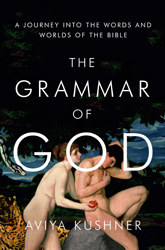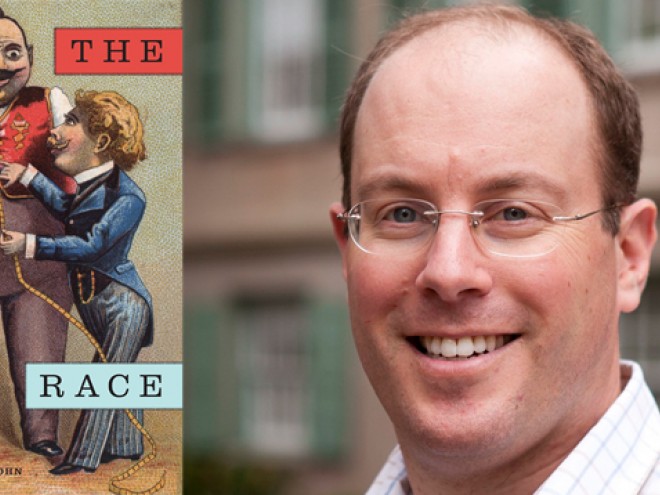
Jewish Book Council is proud to introduce readers to the five emerging nonfiction authors named as finalists for the 2016 Sami Rohr Prize for Jewish Literature. Today, we invite you to learn more about Aviya Kushner and her book The Grammar of God: A Journey into the Words and Worlds of the Bible, a memoir of rediscovering in translation the Bible she knew by heart in Hebrew.
A warm congratulations to Aviya and the other four finalists: Dan Ephron, Lisa Moses Leff, Adam D. Mendelsohn, and Yehudah Mirsky. Be sure to check back soon to see which of these authors will be taking home the $100,000 prize!
What are some of the most challenging things about writing nonfiction?
 Nonfiction demands an engagement with facts, and the challenge is to make information interesting. Sometimes the writer has to make the case that the seemingly arcane and nitty-gritty matters help us understand our world. The best nonfiction writing reframes reality and by providing essential context, makes the reader see the world we live in anew.
Nonfiction demands an engagement with facts, and the challenge is to make information interesting. Sometimes the writer has to make the case that the seemingly arcane and nitty-gritty matters help us understand our world. The best nonfiction writing reframes reality and by providing essential context, makes the reader see the world we live in anew.
What or who has been your inspiration for writing nonfiction?
I became interested in the possibilities of nonfiction while working as a journalist in Jerusalem. I interviewed the 14-year-old brother of two sisters who were killed in the Dolphinarium bombing, and I could not stop thinking about him — and how his life was forever changed. Most journalists quickly moved on to the next bombing, because the news cycle focuses on event, but I felt that what happened to the brother after this tragedy was an important subject, and that how people live after terror was something worth exploring too. I realized that the essay was a place to explore aftermath, to look at the deep roots of events and to consider their longstanding effects.
Who is your intended audience?
I think the Bible should interest everyone — religious and secular — because it has shaped Western culture and has had a major influence on law, literature, politics, and finance. The Bible matters whether you are Jewish or Christian or Muslim or neither, in part because it has meant something so different to each of these groups. So my intended audience is intelligent readers who want to understand how different readings of the Bible have made our world.
Are you working on anything new right now?
I’m deep in a new book that takes place in the twelfth century. It was also a time of religious violence, and I am interested in one particular thinker who crossed boundaries of faith and thought.
What are you reading now?
Right now I’m reading many books of contemporary global nonfiction, for a graduate course I am teaching. I recommend The Fault Line by Paolo Rumiz, which I recently taught for that class. I also loved a recent novel titled The Big Green Tent by Ludmilla Ulitskaya, as well as the masterful novel The Blizzard by Vladimir Sorokin.
Top five favorite books?
It’s hard to choose, but here are some books I love:
The Collected Poems by W. H. Auden
The Magic Barrel by Bernard Malamud
The Little Virtues by Natalia Ginzburg
Open Closed Open by Yehuda Amichai
And of course, the Tanach, especially the Book of Isaiah.
When did you decide to be a writer? Where were you?
We were reading a Faulkner story titled “Dry September”; I was eighteen and a college sophomore. I remember that every time I read that story I thought something else happened, and in class, there were several different readings presented. I remember thinking “I want to learn to do that” and “I will give it the best shot I have,” and I have never looked back. I loved the idea that a writer could make the reader question everything she believed, and that one story could be read in such wildly different ways. Faulkner made me see the power of rumor and accusation, and he made me ask myself what I really thought. I wanted to be able to do that.
What is the mountaintop for you? How do you define success?
All I ever wanted was to continue writing. Doing that is the only definition I have of success. Being able to write the books I want to write is the mountaintop; I want to work hard and to write something that will last. I love how James Baldwin phrased it: “I want to be an honest man and a good writer.” That’s all there is, to tell the truth and write well.
How do you write — what is your private modus operandi? What talismans, rituals, props, do you use to assist you?
 I often write my first and second drafts, by hand, in coffee shops.
I often write my first and second drafts, by hand, in coffee shops.
What do you want readers to get out of your book?
I want readers to think about the Hebrew of the Hebrew Bible, and to consider what happened as the Bible became both the best-selling and most translated book in human history. I hope readers will be inspired to read translations from different faiths and centuries, and to think about how language shapes how we read and what we believe.
Aviya Kushner teaches in the nonfiction writing program at Columbia College Chicago. She is also a contributing editor at A Public Space and a mentor for the National Yiddish Book Center.
Related Content:
- Read Aviya Kushner’s Visiting Scribe posts
- Blabbermouths to Beezlebub: Read an excerpt from The Grammar of God
- The 2016 Sami Rohr Prize for Jewish Literature Finalists



